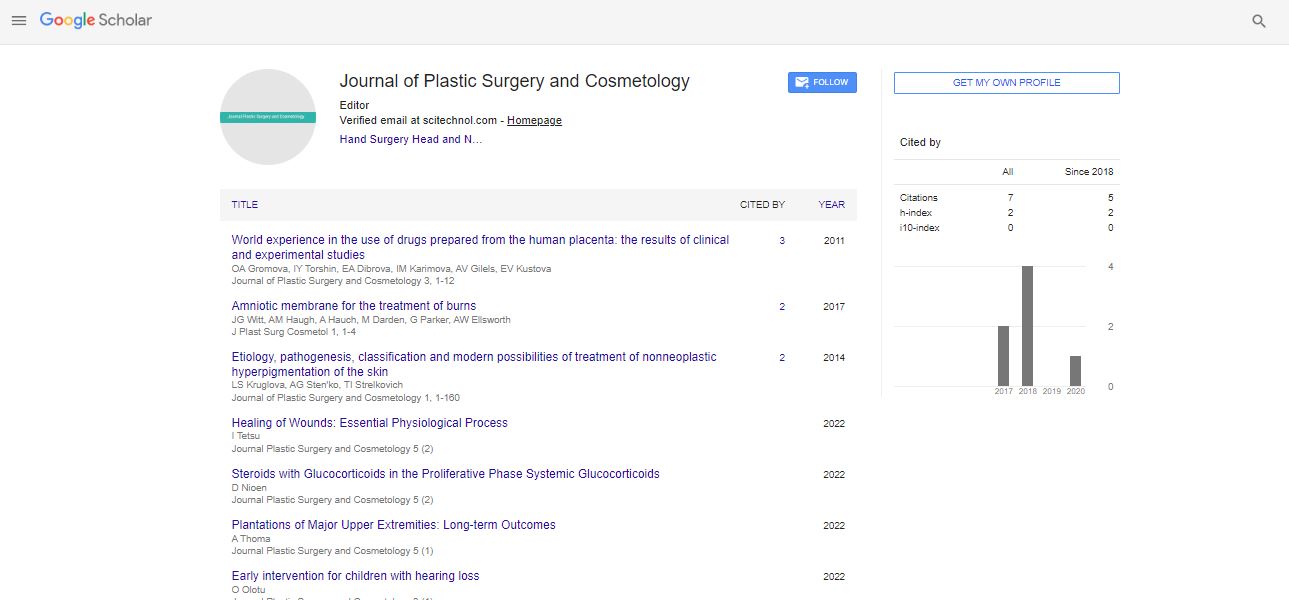Opinion Article, J Pls Sur Cos Vol: 12 Issue: 2
Psychological Considerations in Plastic Surgery and Cosmetology: Mental Health, Body Image, and Ethical Implications
Virve Melis*
Division of Plastic Surgery, Beth Israel Deaconess Medical Center, Harvard Medical School, Boston, USA
*Corresponding Author: Virve Melis,
Division of Plastic Surgery, Beth Israel
Deaconess Medical Center, Harvard Medical School, Boston, United States;
E-mail: Melisrve008@hotmail.com
Received date: 29 May, 2023, Manuscript No. JPSC-23-106761;
Editor assigned date: 31 May, 2023, PreQC No. JPSC-23-106761(PQ);
Reviewed date: 14 June, 2023, QCNo JPSC-23-106761;
Revised date: 21 June, 2023, Manuscript No. JPSC-23-106761(R);
Published date: 30 June, 2023, DOI: 10.4172/JPSC.100048
Citation: Melis V (2023) Psychological Considerations in Plastic Surgery and Cosmetology: Mental Health, Body Image, and Ethical Implications. J Pls Sur Cos 12:2.
Description
Plastic surgery and cosmetology interventions can have profound psychological implications for individuals seeking to enhance their appearance. This study delves into the psychological aspects of plastic surgery and cosmetology, including the influence of body image, motivations behind seeking procedures, and potential psychological effects. Additionally, it addresses ethical considerations related to patient autonomy, societal pressures, and mental health screening. Understanding the psychological dimensions of these interventions is vital for both patients and healthcare professionals to ensure ethical practice and promote mental well-being.
Plastic surgery and cosmetology interventions have both physical and psychological impacts. This study focuses on the psychological considerations associated with these procedures and the implications they have on individuals' mental health and well-being.
Body image and motivations
Body image perception: Body image perception is a complex construct influenced by various factors, including societal standards, media portrayal, cultural norms, and personal experiences. Plastic surgery and cosmetology interventions are often sought to address body image concerns.
Motivations for seeking procedures: Motivations for seeking plastic surgery and cosmetology interventions vary among individuals. These may include enhancing self-esteem, improving self-confidence, correcting physical abnormalities, or meeting societal beauty ideals. Understanding these motivations is essential for healthcare professionals to provide appropriate guidance and support.
Psychological effects and outcomes
Preoperative psychological screening: Preoperative psychological screening can help identify individuals who may have unrealistic expectations, underlying mental health conditions, or Body Dysmorphic Disorder (BDD). Identifying such individuals is an important for proper patient selection and ensuring the best outcomes.
Postoperative psychological effects: While plastic surgery and cosmetology interventions can have positive effects on psychological well-being, they can also lead to postoperative psychological effects, such as body image dissatisfaction, regret, or adjustment difficulties. Postoperative counseling and support play an essential role in addressing these concerns.
Ethical considerations
Patient autonomy and informed consent: Respecting patient autonomy and ensuring informed consent are paramount in the field of plastic surgery and cosmetology. Healthcare professionals should provide comprehensive information about risks, benefits, and realistic outcomes to enable patients to make informed decisions.
Societal pressures and unrealistic beauty ideals: Societal pressures and unrealistic beauty ideals can influence individuals' decisions to seek cosmetic interventions. Ethical considerations should encompass the promotion of a healthy body image, cultural diversity, and patient-centered care that aligns with patients' values and goals.
Mental health screening and referral: Mental health screening should be an integral part of the evaluation process before plastic surgery and cosmetology interventions. Identifying individuals with underlying mental health conditions or body dysmorphic disorder is an important for appropriate management and referral to mental health professionals if necessary.
Mental health support and postoperative care
Psychological counseling and support: Integrating psychological counseling and support services within plastic surgery and cosmetology practices can address patients' emotional needs and aid in the adjustment process. This includes addressing body image concerns, managing expectations, and promoting overall mental well-being.
Long-term follow-up and satisfaction assessment: Long-term follow-up and satisfaction assessment are essential for evaluating the psychological outcomes of plastic surgery and cosmetology interventions. This allows healthcare professionals to monitor patients' well-being and make any necessary interventions or referrals.
Conclusion
Plastic surgery and cosmetology interventions have significant psychological implications for individuals seeking aesthetic enhancements. Understanding the influence of body image, motivations, and psychological effects is an important for healthcare professionals to ensure ethical practice and support patients' mental well-being. The integration of preoperative psychological screening, ethical considerations, and postoperative mental health support can contribute to the overall satisfaction and psychological outcomes of individuals undergoing these interventions.
 Spanish
Spanish  Chinese
Chinese  Russian
Russian  German
German  French
French  Japanese
Japanese  Portuguese
Portuguese  Hindi
Hindi 